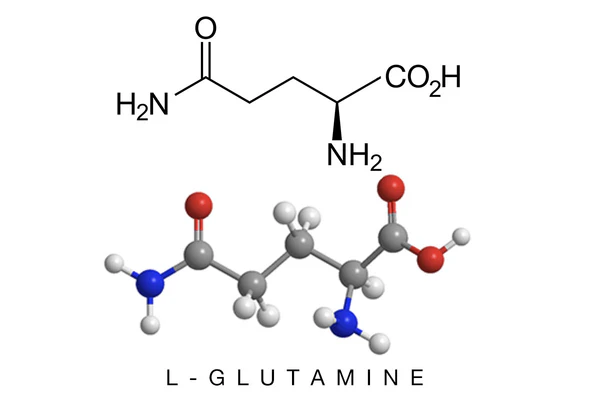Glutamine, often hailed as one of the most important amino acids in the human body, has gained immense popularity in the health and fitness world. Whether you’re an athlete looking to optimize performance, someone recovering from an illness, or simply interested in improving overall well-being, glutamine can play a pivotal role. In this comprehensive guide, we’ll explore what glutamine is, its benefits, and how to incorporate it into your routine.

What Is Glutamine?
Glutamine is a non-essential amino acid, meaning the body can produce it on its own. However, during periods of stress, illness, or intense physical activity, the body’s demand for glutamine may outpace its ability to produce it. It is the most abundant amino acid in the bloodstream and plays a critical role in various physiological processes, including protein synthesis, immune function, and gut health.
There are two forms of glutamine:
- L-Glutamine – Found in dietary supplements and naturally in foods like meat, eggs, and dairy.
- D-Glutamine – A less biologically significant form with limited relevance to human health.
Key Benefits of Glutamine
1. Supports Muscle Recovery and Growth
For athletes and fitness enthusiasts, glutamine is a staple supplement. During intense workouts, glutamine levels in the body can deplete significantly, leading to muscle fatigue and slower recovery. Supplementing with glutamine helps:
- Reduce muscle soreness.
- Promote protein synthesis, aiding muscle repair.
- Prevent muscle breakdown (catabolism), especially during calorie deficits or intense training cycles.
2. Boosts Immune System Function
Glutamine serves as a critical energy source for immune cells, such as lymphocytes and macrophages. During periods of stress or illness, your immune system relies heavily on glutamine to function optimally. Supplementing with glutamine can help:
- Strengthen the immune response.
- Reduce the risk of infections, particularly in athletes undergoing strenuous training.
- Support recovery from illnesses or surgeries.
3. Improves Gut Health
Your gut is home to trillions of bacteria that play a crucial role in digestion and overall health. Glutamine is the primary fuel for enterocytes, the cells lining the intestinal wall. It helps:
- Maintain the integrity of the gut lining, preventing “leaky gut syndrome.”
- Enhance nutrient absorption.
- Reduce inflammation in the digestive tract, particularly beneficial for individuals with conditions like irritable bowel syndrome (IBS) or Crohn’s disease.
4. Aids in Stress and Recovery
Glutamine is a key player in balancing the body’s stress response. During periods of high physical or mental stress, glutamine levels can drop, leading to fatigue and impaired recovery. Supplementation helps:
- Restore glutamine levels post-stress.
- Enhance overall recovery from injuries or illnesses.
5. May Support Weight Management
While not a direct fat-burning agent, glutamine has been shown to influence weight management by:
- Supporting lean muscle mass, which increases basal metabolic rate (BMR).
- Regulating blood sugar levels, reducing sugar cravings.
- Helping with satiety, making it easier to maintain a caloric deficit.
Sources of Glutamine
Dietary Sources
Glutamine can be found in a variety of foods, including:
- Meat: Beef, chicken, and pork.
- Dairy: Milk, cheese, and yogurt.
- Plant-Based: Spinach, cabbage, beans, and tofu.
Supplementation
Glutamine supplements are widely available in powder, capsule, and tablet forms. Dosages typically range from 5 to 20 grams per day, depending on individual needs and goals. It’s essential to consult with a healthcare provider or nutritionist to determine the right dosage for you.
Who Should Consider Glutamine Supplementation?
- Athletes and Bodybuilders: To enhance recovery, reduce muscle soreness, and support immune function during intense training periods.
- Individuals with Digestive Disorders: Those with conditions like IBS, Crohn’s disease, or “leaky gut” may benefit from improved gut health.
- Recovering Patients: People recovering from surgery, illness, or severe injury can use glutamine to accelerate healing.
- Individuals Under Stress: Chronic stress depletes glutamine levels, and supplementation can help restore balance.
Are There Any Side Effects?
Glutamine is generally considered safe for most people when taken in recommended doses. However, excessive intake (above 40 grams per day) can lead to side effects like:
- Gastrointestinal discomfort.
- Headaches.
- Nausea.
Pregnant and breastfeeding women, as well as individuals with kidney or liver conditions, should consult a doctor before using glutamine supplements.

How does glutamine age in your body?
Glutamine, a non-essential amino acid, plays a crucial role in muscle health, recovery, and overall cellular function. As you age, the production, utilization, and levels of glutamine in your body can undergo significant changes. Here’s a breakdown of how glutamine interacts with your body over time:
1. Decreased Natural Production
As the body ages, its ability to produce glutamine naturally may decline. This reduction can be attributed to changes in metabolic activity, hormonal fluctuations, and overall muscle mass reduction, which naturally occurs with aging.
2. Increased Demand During Stress or Illness
Glutamine is a critical fuel source for immune cells and the gastrointestinal lining. As you age, the body’s ability to manage stress and recover from illness decreases, often leading to a higher demand for glutamine. In periods of chronic stress or illness, glutamine reserves can become depleted more quickly, impacting muscle recovery and immune function.
3. Impact on Muscle Maintenance
Glutamine supports muscle protein synthesis and reduces muscle breakdown. However, as sarcopenia (age-related muscle loss) sets in, the body’s efficiency in utilizing glutamine for muscle preservation diminishes. This makes dietary intake or supplementation more crucial for maintaining muscle mass in older adults.
4. Role in Recovery and Wound Healing
Glutamine is essential for recovery, particularly after exercise or injury. Aging slows down cellular repair processes, and a diminished glutamine supply can further impede the body’s ability to heal wounds or recover after physical activity.
5. Dietary and Supplementary Needs
Aging individuals may need to increase their glutamine intake through diet or supplements to counteract natural declines. Foods like chicken, fish, eggs, dairy, and certain vegetables (e.g., spinach, cabbage) are rich in glutamine and can help maintain optimal levels.

Conclusion
Glutamine is a versatile amino acid that offers a wide range of benefits, from supporting muscle recovery to boosting gut health and immune function. Whether you’re an athlete pushing your limits or someone seeking better overall health, glutamine can be a valuable addition to your nutrition and wellness regimen. As with any supplement, it’s important to ensure that it complements a balanced diet and lifestyle for maximum effectiveness.



